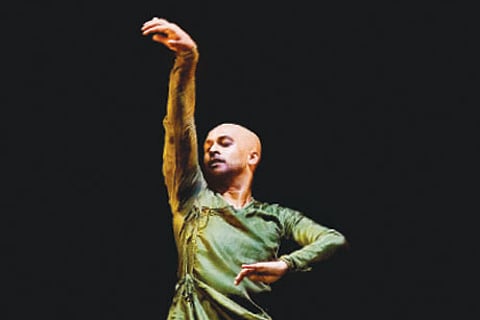

Rooted, rootless. Grounded, floating. East, West. London, Bangladesh. Kathak, Contemporary. “You need to have a sense of the grounded, in one form or the other, to be able to appreciate a sense of the floating; there should always be a tension between the two,” globally acclaimed contemporary dancer Akram Khan pronounces over an international call. It’s 10.20am in London (2.50pm in India) and Khan is on his way to Heathrow where he will board a direct flight to Chennai that will be among the first cities to witness Gnosis, this evening (September 2). Khan’s is the last act in The Park’s New Festival (that opened on August 29) but unarguably the jewel in the crown this edition. From Chennai, the festival will travel to Bangalore, Hyderabad, Mumbai, Kolkata, and Delhi.
It isn’t often we meet, interview or watch a performance of someone who very matter-of-factly says, “I told Danny (Boyle), I’d only do a small solo in the section of the opening ceremony of the London Olympics. You see, I didn’t want to shock my body.” In January this year, Khan injured himself in what he describes a “catastrophic” way. “I had to undergo a surgery followed by an intense and a rather excruciating rehabilitation in order to get back to dance and in a way, ready for the opening act of the Olympics,” the dancer says.
And he is. “It’s an old body but at the same time, new,” Khan says referring to his own return to dance. “The doctor actually said I’d never be able to dance,” he says, “But you see, I’ve never accepted someone telling me I cannot do something; my mission would then be to prove that person wrong.” He means what he says. Three days before boarding his flight, Khan and his entourage just returned to London after a ten-day tour in Germany. Journeying with Gnosis, that is part-Kathak and part-contemporary and in a sense, closest to Khan, the person and the performer, he acknowledges the “opportunity to present the work to an Indian audience. I think it’s great for them (read audiences in India) to see work that involves Indian classical dance and the kind of searching that is happening in countries outside of where it belongs.”
Gnosis, winner of the prestigious South Bank Sky Arts Dance Award 2011 (UK), was born nearly three years ago against the backdrop of Khan’s dire need and desire to explore and express the tension of the opposites in a way that it is “subtle, but intense”. “It’s not easy,” he says, referring to the work, where the classical and the contemporary exist in one and at the same time, “It’s extremely challenging for the body.”
That struggle has been a constant in Khan’s journey in dance. It has also served as a fodder for his creations that are an aesthetic mingling of tradition and innovation. “There’s no way that I can take Kathak out of me,” he says, “Honestly, I’ve never tried to hide it either.” “In my scheme of things, Kathak and the contemporary are inseparable. However, the mind can separate. I like to look at classical dance as a spiritual process and the contemporary as a science. When I’m dancing Kathak, I feel like I’m in a temple and while I’m floating in the contemporary, I get a sense of being in a laboratory of sorts where we are dissecting, investigating, examining.…”
It’s perhaps the need of the hour; art and its relevance in the context we live and exist. “To tell you the truth,” he says, “I don’t quite fully understand the place we live in. If you’d asked me this question ten years ago, I’d probably be able to explain it. But right now, I have way too many questions with regard to the place we live in.” Khan laments that art is becoming economical, he says, “Money is dominating the arts in a huge way. Everything is becoming really about immediacy rather than longevity.”
“For me, there is a spirituality of a kind in the search for achieving something; something bigger than yourself. As an artiste, it wasn’t and hasn’t ever been about the fame. Dance really doesn’t define who I am; what I do for it, within it, is really my identity,” says Khan.
Talking of identity, it’s interesting, how Khan collaborates with artistes across the world to create a universal language that freely speaks to everyone and let them respond to it in a manner of their own. “If you ask me, the words cross-cultural collaborations have become a bit cliché now,” he says, “We are doing that subconsciously, anyway. Look, in a city like London, culture in all walks of life is changing, merging and transforming lives. What is important, if you ask me, is a sense of humanity.” No two ways about that!